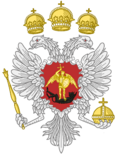Unio Trium Nationum
Jump to navigation
Jump to search
This article is incomplete because it is pending further input from participants, or it is a work-in-progress by one author. Please comment on this article's talk page to share your input, comments and questions. Note: To contribute to this article, you may need to seek help from the author(s) of this page. |
Union of the Three Nations 3 other official names
Unio Trium Nationum | |||||||||
|---|---|---|---|---|---|---|---|---|---|
| 1439–1790 | |||||||||
| Motto: "Virtus per Unitatem" "Ⰲⰹⱃⱅⱆⱄ ⱂⰵⱃ ⱆⱀⰹⱅⰰⱅⰵⰿ" "Strength through Unity" | |||||||||
| Anthem: Triumphal March of His Majesty the Domnitor Marșul triumfal al Măriei Sale Domnitorul | |||||||||
| Capital | Arciluco | ||||||||
| Common languages | Amathian Slirnian Miruvian | ||||||||
| Religion | Episemialism Solarian Catholicism | ||||||||
| Demonym(s) | Trinarian | ||||||||
| Domnitor | |||||||||
• 1462-1479 | Manuel the Good | ||||||||
| Legislature | Brotherly Council | ||||||||
| History | |||||||||
• Established | 1439 | ||||||||
• Disestablished | 1790 | ||||||||
| Currency | Libro | ||||||||
| |||||||||
| |||||||||
The Union of the Three Nations was a personal union of the crowns of Amathia, Novalia and Carinthia, ruled by a common monarch, who claimed the old Arcilucan reigning title. It was born as a pact of mutual aid between the nobles of the three realms against foreign aggression and peasant rebellions, codified in the Treaty of Praproče. Defeats against Antonica and the Great Rebellion of Tirideva ended in the Covenant of Cluzia, which formalized the rights of the Carinthian and Novalian nobles as equal to the estate of the Amathian nobles, formally serving as the beginning of the Union.

